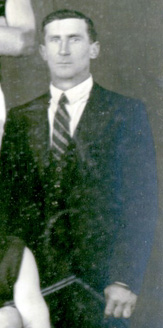Henry Victor (Harry) Fowler
From Our Contribution
 | |
 Excerpt from 1934 Armadale AFL team photo | |
| Personal Information | |
|---|---|
| Date of Birth | 5 Nov 1898 |
| Place of Birth | Perth, Western Australia |
| Death | 16 Jul 1985, aged 86 |
| Place of Death | Narrogin, Western Australia |
| Age at Enlistment | 42 years, 9 months |
| Description | 5'6½" (1.69m) tall ; ; Medium complexion ; blue eyes ; Brown hair |
| Occupation | Butcher |
| Religion | Roman Catholic |
| Address | Railway avenue, Armadale, Western Australia |
| Next of Kin | Wife , Mrs. Elsie May Napier |
| Military Information | |
| Reg Number | W26638 |
| Date of Enlistment | 13 Aug 1941 |
| Rank | Private |
| Unit/Formation | 26th Australian Employment Company |
| Post War Details | |
| Fate | Remained in Australia |
Pre War
During 1919 Henry married Elsie May Napier (1898 - 1985) in Perth.
War Service
On 13 Aug 1941 Harry was mobilised and posted to the 5th Australian Garrison Battalion. On 19 Mar 1942 he was classified for pay purposes as a Butcher TG III, remaining with the 5th Garrison Battalion until 28 Aug 1944 when he was transferred to the 10th Australian Garrison Battalion on Rottnest Island, where he remained for the rest of the war.
Following the end of the war Harry volunteered to be a member of the Interim Army (CMF), remaining with the 10th Garrison Battalion until 17 Jun 1946 when he transferred to the 26th Australian Employment Company. As a member of the Interim Army from 30 Sep until 19 Oct 1946 he was detached to the Camp Commandant at Pemberton, and from 14 Oct until 14 Nov 1946 to the Engineering Base Store at York. On 14 Nov 1946 he was transferred to the 7th Australian Advanced Ordnance Depot and then on 30 Jan 1947 to the 9th Base Ordnance Depot. His final move as a member of the Interim Army was on 7 Mar 1947 when he was transferred to Western Command Recruit Reception & General Details Depot from which he was discharged on 12 Mar 1947.
Post War
Electoral Roll entries: 1954 - 1958 at Railway avenue, Armadale, butcher;
Notes
During the period 1939 - 1945 some unit names changed more than once. In the case of Australian Employment Companies they were also known as Works Companies, Labour Companies, Labour Units, Labour Corps. For sake of consistency I have adopted the term Employment Company. The role they played did not change with title. They were established to ensure that the Australian Defence Force had a large force of soldiers dedicated to essential labouring tasks, providing the physical labour needed to maintain the war effort and support the fighting forces.
Of the total of 39 Companies, 11 were part or fully manned by non British citizens known then as 'aliens'. These alien companies were not issued with arms. The 26th Company was formed with British citizens.